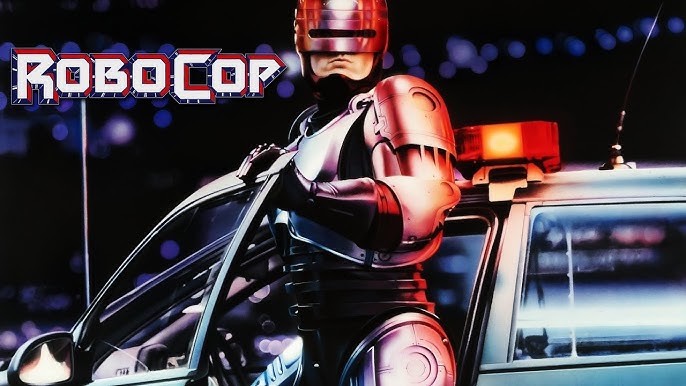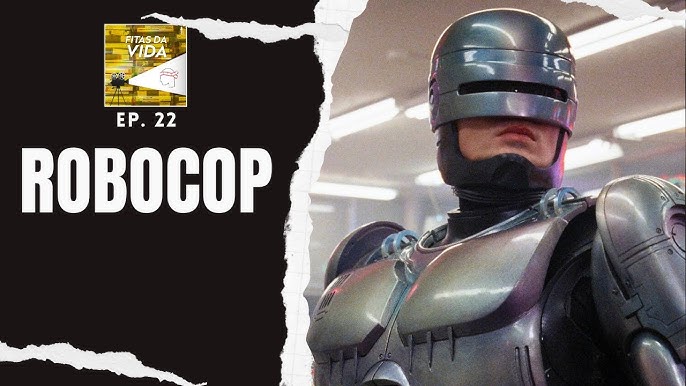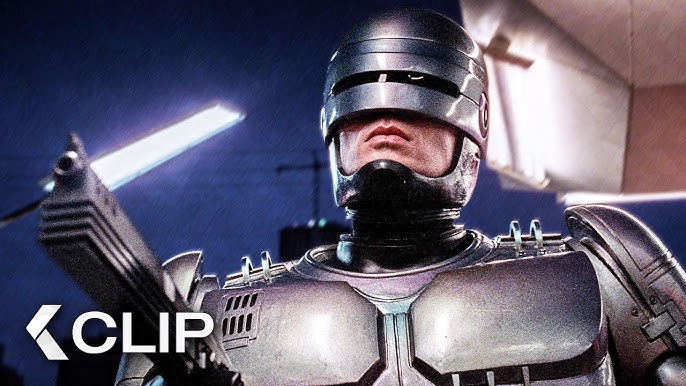🎬 RoboCop: A Sci-Fi Classic Blending Action, Satire, and Social Commentary (1987)

RoboCop (1987), directed by Paul Verhoeven, is a groundbreaking science fiction action film that has become iconic for its thrilling action sequences, dark humor, and sharp social critique. Set in a dystopian future where crime and corporate power run rampant, the film follows the story of a brutally injured police officer who is transformed into a cyborg law enforcer. With its blend of intense action, thought-provoking themes, and unforgettable characters, RoboCop remains a significant entry in both the sci-fi and action genres.
🤖 Plot Overview: Man and Machine Unite Against Corruption
In a near-future Detroit, crime is out of control, and the city’s police department has been privatized by the powerful conglomerate Omni Consumer Products (OCP). Seeking a solution to rising crime rates, OCP develops the RoboCop program, turning fallen officer Alex Murphy (Peter Weller) into a half-human, half-machine enforcer.
Murphy, who was brutally killed in the line of duty, is resurrected as RoboCop—a nearly indestructible cyborg with a strict directive to uphold the law. As RoboCop begins to clean up the city, he starts to experience fragments of his former life, slowly regaining memories of his family and the gang responsible for his murder. As he confronts the criminals who wronged him, he also uncovers corruption within OCP, realizing that the company’s ruthless ambitions are as dangerous as the crime it claims to combat.

🎭 Iconic Performances and Memorable Characters
- Peter Weller as Alex Murphy/RoboCop: Weller’s performance as RoboCop is both intense and subtle, as he conveys the mechanical precision of a cyborg while maintaining an underlying humanity. His portrayal of Murphy’s gradual rediscovery of his identity adds emotional depth, making him a compelling and sympathetic character.
- Nancy Allen as Anne Lewis: Allen plays Officer Anne Lewis, Murphy’s former partner, who becomes one of RoboCop’s few allies. Her loyalty and compassion toward Murphy provide a human connection and underscore the film’s themes of friendship and loyalty in a world where humanity is often disregarded.
- Kurtwood Smith as Clarence Boddicker: Smith’s portrayal of the sadistic gang leader Clarence Boddicker is chilling and memorable. His character serves as a terrifying representation of the unchecked violence that plagues Detroit, and his scenes with RoboCop add tension and grit to the narrative.
- Ronny Cox as Dick Jones: Cox’s performance as OCP’s corrupt executive Dick Jones brings a sinister corporate villain to life. As RoboCop’s main antagonist within the OCP hierarchy, Jones exemplifies the corporate greed and lack of ethics that the film critiques.
💥 Groundbreaking Visuals and Practical Effects

RoboCop is known for its gritty visual style and practical effects that push the boundaries of 1980s filmmaking. The character of RoboCop himself is brought to life with an intricate suit designed to resemble a high-tech, armored exoskeleton, enhancing the cyborg’s powerful, mechanical movements. The effects team used stop-motion animation and practical effects to create the ED-209 robot, RoboCop’s intimidating law-enforcement counterpart, resulting in memorable scenes that showcase the film’s intense action and technological prowess.
The film’s use of exaggerated gore and violence, although controversial, serves to underline its satirical message, showing the brutal consequences of unchecked power and corporate influence in a world where humanity has been devalued.
💡 Themes of Identity, Humanity, and Corporate Corruption
At its core, RoboCop explores questions of identity and humanity. RoboCop’s journey to reclaim his memories and sense of self reflects the struggle to maintain personal identity in a society increasingly dominated by technology and corporate interests. The film examines what it means to be human, questioning whether the soul can endure in a body that’s been transformed into a machine.

The film also critiques corporate greed, as OCP’s motives reveal a willingness to prioritize profit over human lives. RoboCop presents a dystopian vision of a world where companies wield power over both people and law enforcement, foreshadowing concerns about privatization and the dangers of corporations shaping public institutions.
🎶 Memorable Score and Sound Design
The film’s iconic score, composed by Basil Poledouris, is both heroic and haunting, perfectly complementing RoboCop’s duality as both man and machine. The stirring theme music underscores key moments, adding emotional weight to RoboCop’s struggle for self-identity and amplifying the intensity of action scenes. The sound design, particularly the mechanical sounds of RoboCop’s movements, enhances the immersion, reminding viewers of the hero’s cybernetic nature.
🎬 Film Details:
- Title: RoboCop
- Director: Paul Verhoeven
- Release Date: July 17, 1987
- Cast: Peter Weller, Nancy Allen, Kurtwood Smith, Ronny Cox
- Genre: Sci-Fi, Action, Crime
- Runtime: 1h 42m
- IMDb Rating: 7.6
- Notable Aspects: Iconic character, groundbreaking effects, satirical social commentary
🏆 Final Verdict: A Sci-Fi Action Classic with Depth and Satire

RoboCop remains a classic for its successful blend of action, science fiction, and social critique. With memorable characters, groundbreaking visuals, and a story that balances intense action with thought-provoking themes, the film delivers a unique cinematic experience that goes beyond the surface of a typical action movie. Paul Verhoeven’s direction brings out both the dystopian and satirical elements, making it a film that resonates on multiple levels.
For fans of sci-fi and action, RoboCop is an essential watch that raises questions about humanity, technology, and power that are just as relevant today as they were in 1987. With its mix of visceral excitement and intellectual substance, RoboCop offers a thrilling yet reflective journey into a darkly imagined future.










